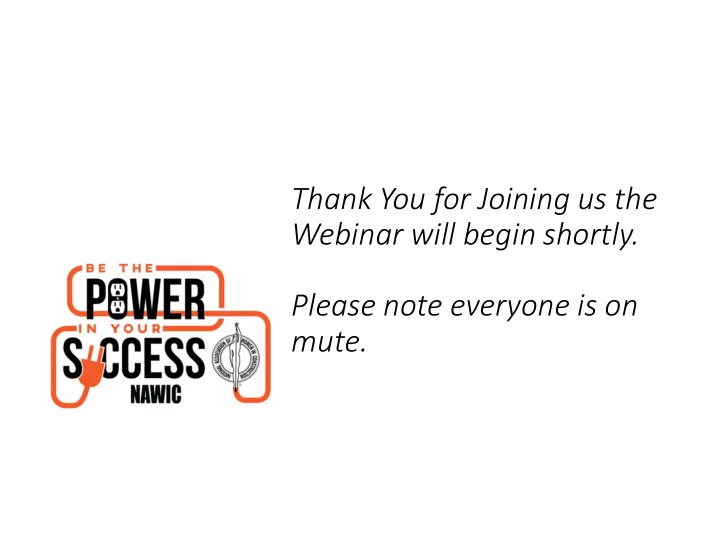

Thank You for Joining us the Webinar will begin shortly. Please note everyone is on mute.
Professional Development & Education 2018-2019 Webinar Series
Upcoming Webinars • NEF and the Construction Document Technician • Presented by Peggy Newquist • WEDNESDAY, March 20 th • 12:00 pm CT • In anticipation of testing at Annual Conference
I NTRODUCTION TO E MOTIONAL I NTELLIGENCE Leasa Geerlings, Learning and Development Manager - JE Dunn Construction
A GENDA Learning Objectives What is EQ? What traits make up our EQ? How do we use EQ in difficult communications? Create an action plan Conclude
L EARNING O BJECTIVE : W HAT ’ S IN IT FOR YOU! By the end of this session, you will … Increase awareness of emotional intelligence and how these skills contribute to career growth Learn several ways to exercise emotional intelligence Evaluate your emotional intelligence traits Identify one or two traits to strengthen and create an action plan to do so
W HAT IS E MOTIONAL I NTELLIGENCE (EQ)?
EQ “S KILLS ” Ability to understand the Ability to use awareness of our emotions of others – emotions to stay flexible and Social accurately determine what direct our behavior in positive Awareness they are thinking and feeling and constructive ways Self Relationship Management Management Ability to use awareness of our Ability to perceive our own emotions and other’s emotions and understand our Self Awareness emotions to manage tendencies to act in certain interactions successfully ways in given situations
I MPORTANCE OF EQ “S KILLS ” 90% of top performers are also high in emotional intelligence, and people with average IQs outperform people with high IQs 70% of the time because of greater emotional intelligence – TalentSmart A survey of 400 companies cited an average loss of $62.4 million per year (per company) because of inadequate communication to and between employees – David Grossman 92% of nearly 900 executives said soft skills were equally important or more important than technical skills, yet 89% said they have a “very or somewhat difficult” time finding employees with those soft skills – WSJ People who say they are good communicators overestimate their abilities. Researchers paired subjects with people they knew well and then again with people they’d never met - University of Chicago Booth School of Business Researchers
U SING EQ T IP #1: U NDERSTAND AND M ANAGE S TRESS
U SING EQ T IP #2: F IND ( AND USE ) Y OUR V OICE Even though we have thoughts and opinions to share, many of us “clam up” in stressful situations . Our brains are in flight/freeze mode – so we don’t say anything. We withhold information because we think sharing it will be harmful somehow. Move forward by focusing on what you REALLY want • For yourself • For others involved • For the relationship • For the organization Source: Patterson, K., Grenny, J., McMillan, R., & Switzler, A., (2012). Crucial conversations: tools for talking when stakes are high (2 nd ed.). New York, NY: McGraw-Hill.
U SING EQ: T IP #3 I NFLUENCE OVER A BRASION Sometimes, our thoughts and opinions are strong, and we go overboard to make sure others are convinced we are absolutely right. Our brains are in fight mode – so we may attempt to convince, control or compel others to our point of view. Move forward by focusing on what you REALLY want • For yourself • For others involved • For the relationship • For the organization
U SING EQ: T IP #4 T AKE THE IBR A PPROACH Make good relationships the priority Separate the people from the problem Listen carefully to other’s interests Stay fact-based (use objective criteria) Generate options together Sources: Fisher, R., Ury, W., & Patton, B. (1991). Getting to yes: Negotiating agreement without giving in (6 th ed.) New York, NY: Penguin Books.
D EVELOPING YOUR EQ: A CTION P LAN Complete Self Assessment Reflect on what you have learned today List one or two things you like to do to improve your EQ Meet with your manager or trusted mentor within 2 weeks of returning to the job. Discuss what you learned and how you’d like to improve. Work with your manager/mentor and make an effective improvement plan.
Recommend
More recommend